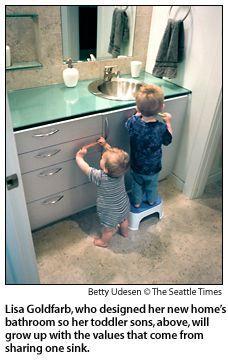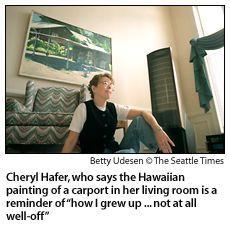|
|
|||
|
|
Monday, November 5, 2000, 8:00 a.m. Pacific
Sudden wealth, hard questions: By Carol M. Ostrom
As she pondered the floor plans for her new, custom-built, lake-front home, Lisa Goldfarb was struck by the symbolism of sinks.
|
||||||||||||||||||||||||||
|
But Goldfarb remembered her childhood: raised by a single mom, sharing a bathroom and a single sink with her two brothers. How it forced them together, to squabble and then to work it out. To share.
More than a year later, her family has settled into the house – a light-filled space with lots of shining curly maple and a stunning view of Lake Sammamish.
Her dilemma, she knows, was never really about sinks.
It was about parents making sure their children grow up with the right values, with the stuff money can't buy. About teaching them how to live with other people.
'Sharing is part of what you have to learn! These guys are going to share the sink.' |
Goldfarb and her husband, Christopher, are sure the values they grew up with helped them become the people they are today. They learned how to work hard, to follow their dreams, to value the skills of teachers, artists, farmers.
As they grew into adulthood, never expecting that one day they would be wealthy, they found themselves secretly mocking the pretensions of the really rich.
Now, like many of the newly wealthy, Goldfarb feels a need for vigilance. Money magnifies a person's every value, she believes.
She looks around her children's playroom, shelves well stocked with bright-colored toys, where the nanny has left notes about naps and snacks. Some parents she knows are thinking about hiring two nannies, she says, so their two children won't have to share.
She rolls her eyes and laughs, a big, I-don't-care-who-hears-this whoop. "Sharing is part of what you have to learn. These guys are going to share the sink."
An unfamiliar landscape
Sudden wealth has washed across Puget Sound like a hurricane, transforming the familiar landscape for individuals such as Goldfarb and for the community.
In the Seattle area, nearly every stratum of society did well during the economic boom of the 1990s. But the big story is how well the upper crust fared: Thanks largely to stock options from Microsoft and a handful of other high-tech companies, the richest 1 percent of King County's full-time workers earned more than 17 percent of the total wages paid in 1998, compared with 6.8 percent of total wages in 1990.
In the last few years, millionaires have popped up around Puget Sound like mushrooms. Estimates vary widely, but the New-York based Spectrem Group, a consulting firm that tracks wealth across the country for private companies, calculates a 70 percent jump from 1995 to 1999 in households in the state with $1 million or more to invest, not counting the value of a primary residence.
Suddenly, once-rare luxuries are everywhere – private planes and custom-designed vacation homes, toddler birthday parties with paid entertainment, BMWs in the high-school parking lot, "household managers" earning more than teachers.
Many of today's suddenly rich are very different from the rich we've known in the past. Many never aimed to become wealthy and certainly never to hit it this big.
Some are entrepreneurs. But many, before they became rich in the high-tech boom, were secretaries, programmers, sales people.
They are people like Tom Ikeda, 44, a Microsoft retiree who grew up in a working-class Rainier Valley home where, he says, "my trajectory was going to be pretty humble." Or former software designer Charles Gust, 35, whose inner-city Chicago family's annual vacation was one day at an amusement park.
This new wealth, says Linda Benson of Hopelink, which runs food banks and shelters on the Eastside, has a "much closer tie to the real world than the generational old wealth, the corporate old wealth, where people were very distant."
'It was a frightening thing to have too much money. What do you do with it? Do you spend it on frivolity? Do you make sure that your children become trust fund babies? How much do you hide?' |
Later, Hafer lived in her car for most of a semester, unable to pay both rent and community-college tuition.
She married, adopted a child and quit work, though money was tight. And then, over the course of a few years, after her husband's computer-services company struck gold, "we found ourselves with a great deal of money."
For many of these newly wealthy, it was like that: the right place at the right time. Not that they weren't smart and hardworking. But serendipity, most acknowledge, had a lot to do with it.
For them, money has provided not only material comfort, but rare opportunities. The chance to quit working. A trip to Bali – with a nanny for the kids. Time and money for a cherished cause.
Or the ability to just do it when it really mattered, like the day Hafer and her husband got the go-ahead to adopt their second child. The newborn was in Astoria at the hospital nurses' station. Hafer had visions of her baby all alone, crying, bonding with a random nurse. So they chartered a helicopter and flew to the coast to pick up their son.
"That was the first time we did something that wasn't available to other people," Hafer says, still struck by the wonder of it all. "These were not choices I ever expected to have. The most I ever expected was to be comfortable, to not worry about where gas money was coming from."
But all these choices, Hafer and others have found, came with questions – both practical and moral – that they still struggle to answer.
| Background, Related Info & Multimedia: |
|
| Related Charts | |
| Skilled workers got better raises | |
| So the gap grew between rich and poor? Maybe not... | |
| ...lower incomes grew too. | |
| Gaining ground on the U.S. | |
| Two ways to measure money |
![]()
| [ seattletimes.com home ] [ Classified Ads | NWsource.com | Contact Us | Search Archive ] |